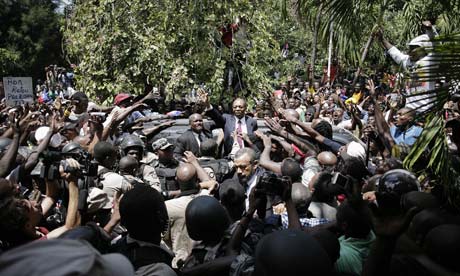Haitian Elections Move Forward No Thanks to Aristide

After hitting some minor speed bumps, the Haitian runoff election ran more smoothly than anticipated on Sunday, March 20.
The run-off candidates, Michel “Sweet Micky” Martelly and former first lady Mirlande Manigat, are still neck and neck in the race to become Haiti’s next president. For a while, the dramatic return of former President Jean-Bertrand Aristide threatened to disrupt the process. Fortunately, observers have verified that the results announced on April 16 will be accurate.
Fourteen months after the destructive Haitian earthquake, the Haitian people faced a choice between a showy pop star (Martelly) and a matronly academic (Manigat) to lead their country to higher ground. The 50-year-old pop singer Martelly ran a well-funded, energetic campaign as a political outsider bringing a fresh, youthful, but many fear entirely inexperienced perspective to Haitian politics. His appeal to a younger demographic was evident when hundreds of frenzied supporters filled the streets to cheer his arrival at the ballots.Former first lady and university professor Manigat, 70, presented herself as a more experienced alternative. Both candidates promise free education, jobs, and housing for the 800,000 people still housed in temporary camps following the earthquake. They will also be challenged to run a Haitian state that works and lives on life support from the international community.
The first round of elections in November were nightmarish. It took months for the Haitians and President Rene Preval, prodded by an Organization of American States (OAS) mission and with some arm-twisting by U.S. Secretary of State Hillary Clinton, to see through the haze of fraud and mistakes to select the run-off candidates.
Just as local conditions seemed relatively stable heading into Sunday’s run-off election, it appeared that the announcement of Aristide‘s homecoming might capsize the ship. Despite President Obama’s best diplomatic efforts—including a March 15 telephone call to South African President Jacob Zuma urging a delay in Aristide’s return trip until after the election—Aristide returned to Haiti in the company of American actor and Castro/Hugo Chavez aficionado Danny Glover from seven years of exile. Aristide’s arrival just days before the election raised the concern that his supporters would refuse to vote or would carry out disruptions.
Aristide’s long-term ambitions are unclear, but his track record of combativeness, polarization, and populism is far from encouraging. Voices sympathetic to Aristide are already attempting to undercut the legitimacy of the elections.
The comparative success of the elections offers hope for a peaceful democratic transition after the preliminary results are announced in March 31 and finalized on April 16. A sizeable percentage of voting centers throughout the country experienced problems with missing ballots and delayed starts. There was no widespread fraud, but dry ink pads and overzealous political supporters did obstruct the voting in some locations. Still, the head of the OAS observer mission, Colin Granderson, confirmed that the second round was “much improved from the first.” “Democracy is on the brink of winning a big victory in our country,” said Provisional Electoral Council head Gailot Dorsinville.
The victor will face the daunting challenge of revitalizing the Haitian economy, housing the displaced, employing international aid to build anew, standing up a government, and preventing a further flare-up of cholera once the rainy season begins again.
Sadly, in his “signal speech” on Latin American policy in Santiago, Chile, President Obama had little to say about Haiti other than to note the holding of elections.
Co-authored by Ashley Mosteller. Mosteller is currently a member of the Young Leaders Program at The Heritage Foundation.

Comments
Post a Comment